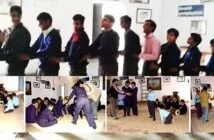Louis Braille was the inventor of braille, a system of reading and writing used by people who are blind or visually impaired
Louis Braille (1809-1852)
Louis Braille was a blind Frenchman who invented the tactile script based on raised dots and named after him, for the reading and writing of the blind.
Braille was born in Coupvray, a small town near Paris and loss his sight at the age of 3 on account of an injury to his eye followed by an infection. Braille studied in Coupvray until the age of ten. Because of his combination of intelligence and diligence, Braille was permitted to attend one of the first schools for blind children in the world, the Royal Institute for Blind Youth, since renamed to the National Institute for Blind Youth in Paris.
Braille was a good student, especially of science and music, and he became a church organist and a skilled cellist. He remained at the Institute as a teacher.
In 1821, an army captain, Charles Barbier de la Serre, visited the institute to demonstrate his invention, “Night Writing.” It used embossed dots and was intended for soldiers to communicate at night without speaking and without lighting a candle in order to read a written message. Louis Braille was inspired by this and by the age of fifteen he developed his system of reading which utilizes raised dots on stiff paper for letters.
Louis trimmed Barbier’s 12 dots into 6, ironed out the system by the time he was 15, then published the first-ever braille book in 1829.He also developed a method of writing music, based on the same system. These inventions were slow in being accepted, but were eventually adopted all over the world as scripts for reading and writing by the blind and for performance by blind musicians. Braille remains an indispensable equipment for the blind. Now practically every country in the world uses braille. Braille books have double-sided pages, which saves a lot of space. Braille signs help blind people get around in public spaces. And, most important, blind people can communicate independently, without needing print.



